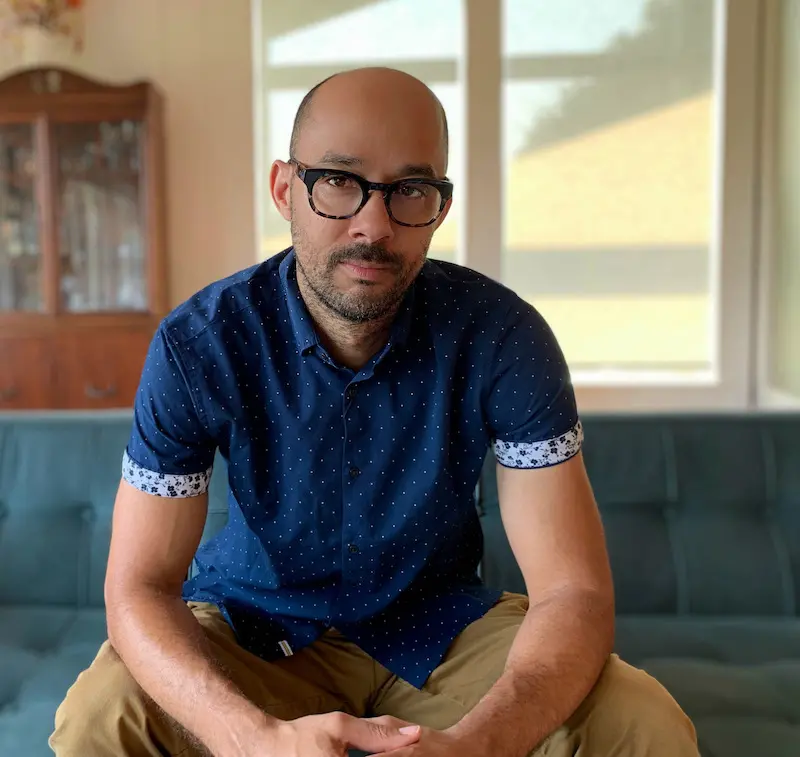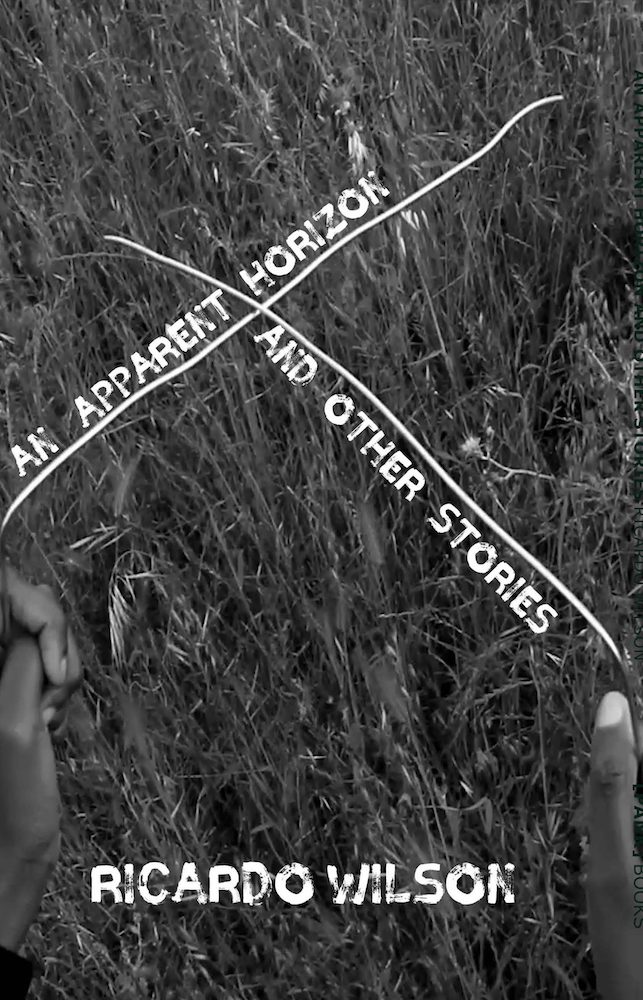The PEN Ten is PEN America’s weekly interview series. This week, PEN America Los Angeles speaks with Ricardo Wilson, author of An Apparent Horizon and Other Stories (PANK Books, 2021).

1. What is one book or piece of writing you love that readers might not know about?
James Baldwin’s The Evidence of Things Not Seen. It was his last book-length work of nonfiction, a meditation on the Atlanta murders between 1979 and 1981. It was published in 1985 when so many had written him off. Even as his legacy looms large, this remains a remarkably underappreciated book. Its ability to give breath to the precarity of Black life in the wake of the civil rights movement was both urgent and well before its time.
2. Where do you write? Some writers have special routines or talismans they keep close by when they write. Do you?
I have moved so many times during my writing life that I never developed a relationship to a particular writing place. In that wandering, music has played the most important role in rooting and focusing me. As a story starts to come together, I spend a bit of time finding a song that will play on a loop in my head.
For “The Deafman,” the last story I wrote for this collection, it was Minnie Riperton’s “Les Fleurs.” After I finished it, I was surprised to discover that Jordan Peele had used it as the song for the credits of Us. While my story is by no means speculative, from an idea perspective it is swimming in similar waters. Makes you wonder what was in Riperton’s soul during that recording session.
“As the collection developed, I became more and more interested in exploring smaller moments where a hard-won psychic coherence begins to erode. In these moments, it is often the subtle antagonism between the slippery concepts of truth and history, both personal and collective, that ultimately animates the writing.”
3. If you had to do something differently as a child or teenager to become a better writer as an adult, what would it be?
Sometimes I wish I had gotten to it earlier. It was after reading Baldwin and John Edgar Wideman with a privacy that, for me, could only come after college that I was drawn to pick up a pen. But honestly, this awkward entrance point has served me well, as I imagine it has other writers who have pushed through a similar trajectory.
So many of my prior passions help me to do what I do. For example, I was so deep into photography in my teens that I built a darkroom in my parents’ basement. And when I’m considering the texture of a piece in its infancy, I feel myself in that same space staring at a print come to life, measuring the moment to place it in the stop bath. My dad is a musician, and I also spent a lot of time in the studio growing up—observing because my talent in terms of singing or playing is nonexistent. I realize now those hours taught me an approach to (and appreciation of) revision, and without it, my writing would be impoverished. A long way of saying it’s been a haul, but I wouldn’t change much.
4. Your story collection An Apparent Horizon and Other Stories journeys through many points in history. How does your writing navigate the relationship between fiction and history? History and truth?
The first story I wrote for the collection, and really the one that placed the bigger ideas on the table for me to sit with, was “The Death of Sam Brown.” It tells the story of a digger turned jeweler during the construction of the Panama Canal who plays a significant role in the trial of a man wrongly condemned. A decade later, back home in his native Jamaica, he is haunted by this past.
It was an opportunity to present a counternarrative that undercut an archive that too often touts progress at the expense of the West Indian bodies, dead and alive, required for the undertaking. As the collection developed, I became more and more interested in exploring smaller moments where a hard-won psychic coherence begins to erode. In these moments, it is often the subtle antagonism between the slippery concepts of truth and history, both personal and collective, that ultimately animates the writing.
“The book’s title comes from an idea Stephen Hawking. . . [who] came to believe that black holes—the gap of all gaps in our collective imagination—in some cases do emit particles, arguing that they do so in a manner so fragmented that these emissions are not readable in any traditional sense. My critical and creative work ruminates on the notion of such an unreadability coming from the gaps within us that nonetheless structures our sense of the worlds we inhabit. This metaphor is intimately linked to the literal ashes of my own life.”
5. Several of the characters in this collection are painfully aware of the gaps in their own knowledge. How has the process of writing this collection shifted or shaped your relationship to the unknown?
The book’s title comes from an idea Stephen Hawking developed toward the end of his life. Contrary to his earlier theorizations, he came to believe that black holes—the gap of all gaps in our collective imagination—in some cases do emit particles, arguing that they do so in a manner so fragmented that these emissions are not readable in any traditional sense. My critical and creative work ruminates on the notion of such an unreadability coming from the gaps within us that nonetheless structures our sense of the worlds we inhabit.
This metaphor is intimately linked to the literal ashes of my own life, as much of this writing took place after the passing of my mom while I was in graduate school. Death is obviously a profoundly disruptive yet ultimately mysterious thing. To find a grounding, I needed to accept that and be still with it. And that process certainly bled from my life into my writing, and vice versa.
 6. What was one of the most surprising things you learned in writing these stories?
6. What was one of the most surprising things you learned in writing these stories?
I learned that poetry is not just important in my reading practice, but that something akin to it needed to show up in my writing in order to help frame and organize the collection. While there are two standalone prose poems that divide the work, there are also several fragments that appear in the final two stories that hopefully help the reader grasp onto the relationship between coherence and fragmentation that the collection builds toward.
7. Writing is an intimate process. This collection now also belongs to readers. How do you prepare for that?
Close my eyes.
In all seriousness, hopefully the work is not only read but reread. That’s what it was designed for. I published my first critical book last summer, and so I am more than aware of the fact that there is a certain anxiety related to your work’s reception. But the folks that take the time to genuinely interact with it make it worth it. As far as the nature of those opinions, I have strong thoughts about the stuff I read and would expect nothing less from my readers.
8. What advice do you have for young writers?
Cultivate a self-awareness of all that you are drawn to, your project, and be patient and persistent as you scratch toward it.
“People come to fiction for so many reasons that I only really feel qualified to answer for myself. I come to a practice of reading for the same reason I face the page as a writer, to untangle my own thought.”
9. Which writers working today are you most excited by?
Being a professor, summer is my catchup time for new reading, and this one has been particularly enjoyable. Brandon Taylor’s Filthy Animals had me at the epigraph, and Lisa Dillman’s translation of Yuri Herrera’s El incendio de la mina El Bordo (A Silent Fury: The El Bordo Mine Fire) was extraordinary. And of course, Ross Gay did it again with Be Holding. I’m now happily working my way through Marina Closs’s Tres truenos. As far as constants, the work of both John Keene and Lillian-Yvonne Bertram was super important as I composed various parts of the collection, and I’m excited to get at their new stuff whenever it comes out.
10. Why do you think people need stories?
People come to fiction for so many reasons that I only really feel qualified to answer for myself. I come to a practice of reading for the same reason I face the page as a writer, to untangle my own thought. As I mentioned before, I just finished Ross Gay’s Be Holding. There is a moment in that poem of implausible flight where he pauses to contemplate how, not if, he—as a writer—is in some ways a docent in the museum of Black pain.
As we know, in Black studies there is a long intellectual history following this line of thought—Gay himself is in an open and sustained conversation with Christina Sharpe. But there was something in the manner of Gay’s utterance that made aspects of my own project come clear to me in a way they had not previously, if only for an instant. Literature offers these flashes, and without them, I am unmoored.
Ricardo Wilson is the author of An Apparent Horizon and Other Stories (PANK Books, 2021) and The Nigrescent Beyond: Mexico, the United States, and the Psychic Vanishing of Blackness (Northwestern University Press, 2020). He is an assistant professor of English at Williams College and the director of Outpost, a residency for creative writers of color from the United States and Latin America. Twitter: @ricardoawilson

